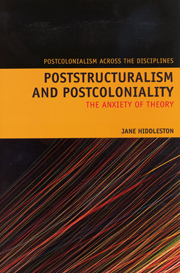Book contents
- Frontmatter
- Contents
- Acknowledgements
- Introduction
- Part One Poststructuralism in Algeria
- Part Two Theory and Cultural Difference
- 4 Displacing Barthes: Self, Other and the Theorist's Uneasy Belonging
- 5 National Identity and Etrangeté: Kristeva's Search for a Language of Otherness
- 6 Spivak's Echo: Autobiography, Narcissism and the Theoretical Voice
- Conclusion
- Bibliography
- Index
6 - Spivak's Echo: Autobiography, Narcissism and the Theoretical Voice
from Part Two - Theory and Cultural Difference
- Frontmatter
- Contents
- Acknowledgements
- Introduction
- Part One Poststructuralism in Algeria
- Part Two Theory and Cultural Difference
- 4 Displacing Barthes: Self, Other and the Theorist's Uneasy Belonging
- 5 National Identity and Etrangeté: Kristeva's Search for a Language of Otherness
- 6 Spivak's Echo: Autobiography, Narcissism and the Theoretical Voice
- Conclusion
- Bibliography
- Index
Summary
The only non-francophone thinker to be included in this study, Gayatri Spivak is closely engaged with many of the French poststructuralists discussed so far and, indeed, she might justifiably be considered to be the archetypal theorist of anxious self-reflexivity. From the beginning her work has been punctuated with reflections on its uncertain efficacy and with caveats or confessions concerning the critic's potential blindnesses. Spivak refuses to set herself up as the purveyor of secure knowledge, of objectivity or falsely neutral exegesis, and she stresses both courageously and anxiously her inevitable complicity with the political, economic and cultural structures she also sets out to critique. Her work contains brief, scattered autobiographical incursions explaining the effects of her privileged education in India and current immersion within the American academic establishment, and she is at pains to emphasise that her work in no way seeks to deny or transcend the context in which it is produced. She draws attention to her marginality as a female intellectual of Indian origin working in the USA, but also immediately questions that marginal status and exposes the risk of commodifying or fetishising the very concept of marginality founding her initial project. Furthermore, Spivak constantly revises and rewrites her own work; she responds to criticism by refining her analyses and is unafraid to admit her errors.
- Type
- Chapter
- Information
- Poststructuralism and PostcolonialityThe Anxiety of Theory, pp. 151 - 174Publisher: Liverpool University PressPrint publication year: 2010

